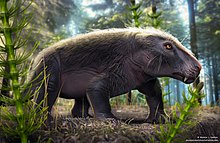Traversodontidae
| Traversodontidae Temporal range: Middle Triassic - Late Triassic, | |
|---|---|

| |
| Life restoration of Siriusgnathus | |

| |
| Skull of Exaeretodon | |
| Scientific classification | |
| Domain: | Eukaryota |
| Kingdom: | Animalia |
| Phylum: | Chordata |
| Clade: | Synapsida |
| Clade: | Therapsida |
| Clade: | Cynodontia |
| Clade: | †Neogomphodontia |
| Family: | †Traversodontidae von Huene, 1936 |
| Subgroups[1] | |
Traversodontidae is an extinct family of herbivorous cynodonts. Traversodonts were primarily Gondwanan, with many species known from Africa and South America. Recently, traversodonts have also been found from Europe and North America. Traversodonts first appeared in the Middle Triassic and diversified in the Late Triassic before going extinct at the end of the epoch. The family Traversodontidae was erected by Friedrich von Huene in 1936 for cynodonts first found in São Pedro do Sul in Paleorrota, Brazil.
Description

Traversodonts are members of Gomphodontia, a group of herbivorous cynognathian cynodonts. As an adaptation toward eating plants, they have wide postcanine teeth behind large canines. These postcanines are closely spaced with their crowns touching each other. Each is usually wider than it is long and is covered in several cusps. Because of their complexity, postcanine teeth are the primary means of identifying and distinguishing different species of traversodonts.
Traversodonts have relatively short skulls. The snout is much narrower than the back of the skull. The tip of the snout is wider than the middle, as it constricts behind the large canines. The tooth rows of the upper jaws are inset while the maxillae and zygomatic arches extend outward, suggesting that traversodonts may have had cheeks. Primitive features of traversodonts include costal plates around the vertebrae, which stabilize the spine. These plates were lost in more advanced traversodonts like Exaeretodon.
Phylogeny
Traversodontidae belongs to a large clade of cynodonts called Cynognathia. Most phylogenetic analyses place it as the sister taxon to the family Trirachodontidae, and both groups are placed in the cynognathian clade Gomphodontia. The analysis of Kammerer et al. (2012) found strong support for two clades within Traversodontidae: the subfamily Gomphodontosuchinae, which had been identified in 2008, and the newly named subfamily Massetognathinae. Below is a cladogram from that analysis:[2]
Paleobiology
While most traversodonts were relatively large cynodonts, particularly Scalenodontoides with extrapolated 60cm skull making it potentially the largest nonmammalian cynodont,[3] some Late Triassic European forms like Maubeugia and Habayia were very small. These traversodonts lived during the Rhaetian stage of the latest Triassic when rising sea levels divided western Europe into an island archipelago. Traversodontids on these islands likely became smaller as a result of insular dwarfism.[4]
See also
References
- ^ Hendrickx, C.; Gaetano, L. C.; Choiniere, J. N.; Mocke, H.; Abdala, F. (2020). "A new traversodontid cynodont with a peculiar postcanine dentition from the Middle/Late Triassic of Namibia and dental evolution in basal gomphodonts". Journal of Systematic Palaeontology. 18 (20): 1669–1706. doi:10.1080/14772019.2020.1804470. S2CID 221838726.
- ^ Kammerer, C. F.; Flynn, J. J.; Ranivoharimanana, L.; Wyss, A. R. (2012). "Ontogeny in the Malagasy Traversodontid Dadadon isaloi and a Reconsideration of its Phylogenetic Relationships". Fieldiana Life and Earth Sciences. 5: 112–125. doi:10.3158/2158-5520-5.1.112. S2CID 84651546.
- ^ Viglietti, P.A.; McPhee, B.W.; Bordy, E.M.; Sciscio, L.; Barrett, P.M.; Benson, R.B.J.; Wills, S.; Tolchard, F.; Choiniere, J.N. (1 June 2020). "Biostratigraphy of the Scalenodontoides Assemblage Zone (Stormberg Group, Karoo Supergroup), South Africa". South African Journal of Geology. 123 (2): 239–248. doi:10.25131/sajg.123.0017. S2CID 225846284.
- ^ Godefroit, P. (1999). "New traversodontid (Therapsida: Cynodontia) teeth from the Upper Triassic of Habay-la-Vieille (southern Belgium)". Paläontologische Zeitschrift. 73 (3–4): 385–394. doi:10.1007/BF02988049. S2CID 129774497.
- Much of this information comes from Traversodontidae


